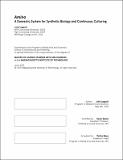| dc.contributor.advisor | Kevin Slavin. | en_US |
| dc.contributor.author | Legault, Julie, S.M. Massachusetts Institute of Technology | en_US |
| dc.contributor.other | Massachusetts Institute of Technology. Department of Architecture. Program in Media Arts and Sciences. | en_US |
| dc.date.accessioned | 2015-09-17T17:41:26Z | |
| dc.date.available | 2015-09-17T17:41:26Z | |
| dc.date.copyright | 2015 | en_US |
| dc.date.issued | 2015 | en_US |
| dc.identifier.uri | http://hdl.handle.net/1721.1/98542 | |
| dc.description | Thesis: S.M., Massachusetts Institute of Technology, School of Architecture and Planning, Program in Media Arts and Sciences, 2015. | en_US |
| dc.description | This electronic version was submitted by the student author. The certified thesis is available in the Institute Archives and Special Collections. | en_US |
| dc.description | Title as it appears in MIT Commencement Exercises program, June 5, 2015: Amino : a system for out-of-lab synthetic biology and continuous culturing Cataloged from student-submitted PDF version of thesis. | en_US |
| dc.description | Includes bibliographical references (pages 64-65). | en_US |
| dc.description.abstract | With the ability to transfer a trait from one creature to another purposefully, synthetic biology is advancing across unforeseen domains. From algae cells that convert carbon dioxide to fuel, biocementation bacteria to terraform mars, and lab-grown meat, synthetic biology offers new materials for designers, technologists, and artists to explore, and yet, public opinion lags behind these scientific advancements. Anytime science advances faster than our ability to apprehend it, it produces progress but also fear, suspicion and uncertainty. Amino -- an object that allows direct interaction with microorganisms to experiment with biology as material -- sets out not simply to educate but to also be part of the early culture that metabolizes the changes underway. Amino is a design driven mini-lab that allows users to carry out a bacterial transformation and enables the subsequent care and feeding of the cells that are grown. Inspired by Tamagotchis, the genetic transformation of an organism's DNA is performed by the user through guided interactions, resulting in their synthetic organism for which they can care like you would a pet. Amino is developed using low cost ways of carrying out lab-like procedures in the home and is packaged in a suitcase-sized continuous bioreactor for cells. | en_US |
| dc.description.statementofresponsibility | by Julie Legault. | en_US |
| dc.format.extent | 75 pages | en_US |
| dc.language.iso | eng | en_US |
| dc.publisher | Massachusetts Institute of Technology | en_US |
| dc.rights | M.I.T. theses are protected by copyright. They may be viewed from this source for any purpose, but reproduction or distribution in any format is prohibited without written permission. See provided URL for inquiries about permission. | en_US |
| dc.rights.uri | http://dspace.mit.edu/handle/1721.1/7582 | en_US |
| dc.subject | Architecture. Program in Media Arts and Sciences. | en_US |
| dc.title | Amino : a domestic system for synthetic biology and continuous culturing | en_US |
| dc.title.alternative | Domestic system for synthetic biology and continuous culturing | en_US |
| dc.title.alternative | Amino : a system for out-of-lab synthetic biology and continuous culturing | en_US |
| dc.type | Thesis | en_US |
| dc.description.degree | S.M. | en_US |
| dc.contributor.department | Program in Media Arts and Sciences (Massachusetts Institute of Technology) | |
| dc.identifier.oclc | 920475033 | en_US |
